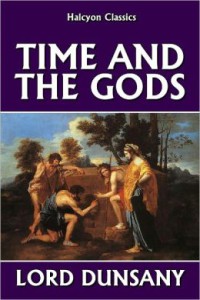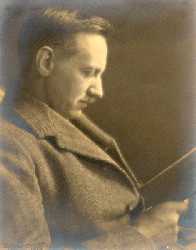Lord Dunsany Re-Read: Time and the Gods Part 4
 Bill Ward and I are continuing our Lord Dunsany re-read with the next two stories published in the original Time and the Gods (not the omnibus). You can find a free copy of the book here and join in the discussion. Our rating system is pretty simple. One star is a standout, and two stars is truly notable. Most of Lord Dunsany’s fantasy work is already fairly remarkable, so even a “no star” story on this scale may be worth a look.
Bill Ward and I are continuing our Lord Dunsany re-read with the next two stories published in the original Time and the Gods (not the omnibus). You can find a free copy of the book here and join in the discussion. Our rating system is pretty simple. One star is a standout, and two stars is truly notable. Most of Lord Dunsany’s fantasy work is already fairly remarkable, so even a “no star” story on this scale may be worth a look.
Bill: Both of this week’s stories are united in the character of Khanazar the King, and both concern his grappling with some pretty weighty aspects of the human condition. I give both stories two stars, though feel “The Cave of Kai” to be the better of the two. In “The Cave,” the King pines for his vanished yesterdays, wondering “Where lie the days that were and certain hours?” He journeys to the cave where such things are kept, but cannot bribe the guardian, cannot even appeal to Kai’s sense of mercy for the return of one second of the past.
But in the strings of a bard’s harp the King does recover some of his yesterdays, and the harper is set up as a sentinel before the Cave of Kai, there to intercept any of those fleeing moments of the King, and preserve them from being lost for all time. The King dies in battle, his deeds surviving in glory thanks to the strings of the bard’s harp.
“Cave,” is a brilliant metaphorical rumination on time and loss; the longing for just one taste of a past that can never be recovered, the desire to have something live on after us. It is through the power of music and story that both things can be achieved.
Howard: I have to agree with Bill and likewise award two stars to each. I think both are excellent but there’s something more emotive to the power of the first and its pervading sense of loss. The other is intellectually as powerful but doesn’t pull at the heartstrings quite as strongly. The concept of the harper who stands guard against the swallowing of events is brilliant, and I love all the metaphors and similes employed around and about the idea.
This may be the third or fourth time I’ve read “The Cave of Kai” and I noticed that sorcerers of seventh degree and lower are mentioned. I wonder if anyone else had ever used such terms? The first time I’d remember magic users of different levels being mentioned was in Fritz Leibers “The Lords of Quarmall” (the only story that retains any of Fafhrd and the Mouser’s co-creator, Harry Otto Fischer’s prose). I wonder if he were inspired by this tale, or if he came up on it separately? I can suppose that it was Lieber more than Dunsany that influenced D&D.
Bill: In “The Sorrow of Search” Khanazar asks a great prophet for the highest truths of existence, the real nature of the gods and of reality. The heart of the story describes the quest of the prophet Shaun, a man whose piety lets him actually see the gods. He worships the four Old gods until he notices three others on a distant mountain, and he departs with followers to set up temples to these new, and presumably, greater gods. The cycle continues with Shaun noticing two gods further off, then one. Dunsany very cleverly plays with audience expectations to make his point here, as the progression of fewer deities until arriving at ‘one true god’ surely fits the logic of most westerners, religious or otherwise. But at the last moment the prophet notices four even greater gods in the distance…and dies learning that they are the same Old gods he had worshiped at the start.
“It is well the sorrow of search cometh only to the wise, for the wise are very few,” says the prophet at the end of his tale, and I suspect this story more than any other thus far illuminates Dunsany’s own thoughts on religion. The coming full-circle nature of the prophets quest has to be seen as a kind of futility, though not necessarily an ignoble one. His “wisdom” seems more to do with his own personality and drive than it does with any actual higher knowledge, received or otherwise. In the tale preceding Shaun’s we are treated to a helpless, mewling, tiny god baffled at the ultimate unknowable, the End of all things. Shaun spends his entire life in the quest for knowledge, and that knowledge always slips just a bit further away on the horizon, it shifts with each new change in Shaun’s perspective. The parable goes beyond religion to encompass all of human knowledge: the quest for a perfect understanding will only see the finish line move further away with each step.
The story concludes with the King asking the prophet just who the true gods were, to which the prophet replies: “Let the King command.” He may have just as well said “that is for you to decide,” and I think, ultimately, that is what Dunsany is saying about the nature of the ultimate knowledge of our existence in this story.
Howard: I’m not sure what to add that Bill hasn’t already pointed out except that this is great stuff! These are tiny little gems of brilliance, fantasy ornaments that ought to be on display for all readers.


2 Comments